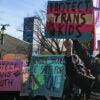Attorney General Eric Holder put a lump of coal in South Carolina’s Christmas stocking on Dec. 23 when he objected to the state’s new voter ID law. By ignoring inconvenient facts and clear legal precedent, Holder showed once again that politics and ideology—not the rule of law—drive his law enforcement decisions. Given the power of the Justice Department and its potential for abuse, this should worry all Americans, particularly when that abuse has the potential to affect the outcome of next year’s election.
South Carolina passed a voter ID law that is almost identical to those implemented by Georgia and Indiana six years ago. It requires a voter to present a South Carolina driver’s license or other photo ID—a passport, military ID, or a voter registration card with a photo issued by South Carolina election officials. Even if a voter shows up at a polling place without an acceptable ID, he can still vote a provisional ballot that will be counted if he brings an ID to election officials before the results are certified. South Carolina’s law is more lenient than either Georgia’s or Indiana’s. If a voter has a religious objection or a “reasonable impediment” that prevents him from getting a free photo ID, then the voter can simply fill out an affidavit in which he outlines his objection or impediment and swears that he is who he says he is. His provisional ballot will then be automatically counted unless local election officials have evidence that “the affidavit is false.”
This new ID requirement is a common-sense reform that can easily be met by voters regardless of their race, ethnicity, or economic status. However, South Carolina is one of the few states still covered under Section 5 of the Voting Rights Act, a civil rights-era law that requires the state to get “preclearance” of any voting change from the Voting Section of the Civil Rights Division at the U.S. Justice Department or a federal court in the District of Columbia. Section 5 was originally passed in 1965 as a five-year emergency provision to remedy widespread, systematic discrimination in the South. Yet it has been frequently renewed—most recently in 2006—even though the official discrimination it was intended to stop has long since disappeared except for isolated incidents.
South Carolina made the grievous error of submitting the state’s new voter ID law to the Justice Department for review, rather than going straight to federal court where it would get an impartial hearing. The history of this Justice Department over the past three years, from the New Black Panther Party voter intimidation case to the refusal to defend the Defense of Marriage Act, has been one in which raw politics and ideology are driving law enforcement decisions.
Holder’s flawed outlook on voter ID laws, as he outlined it recently in a speech at the LBJ Library in Texas, matches the racial paranoia of the Democratic National Committee and the NAACP, each of which claims erroneously that voter ID laws are an attempt to suppress minority votes comparable to Jim Crow. This is a historically preposterous idea. But there was no way that South Carolina was going to get a fair, objective, and nonpartisan review of its voter ID law from this Justice Department, particularly given the parallel views of the radicals hired into career civil service positions within the Civil Rights Division.
In its objection letter to South Carolina, the Justice Department wrongly claims that voter ID would have a discriminatory impact on “non-white” voters. To get to that conclusion, however, DOJ manipulated the statistics to claim that “minority registered voters were nearly 20% more likely to lack DMV-issued ID than white registered voters, and thus to be effectively disenfranchised by” the law’s requirements. This is not a legitimate claim, given the actual data and the provisions of the law.
South Carolina compared its voter registration list to its DMV records. That data showed that out of 2.7 million registered voters, only 240,000 (active and inactive voters) did not have a DMV-issued photo ID (there was no telling how many of those hold military IDs or passports). When broken down by race, DOJ claimed that of the registered voters, 8.4 percent of whites do not have a photo ID compared to 10 percent of blacks. DOJ’s entire claim of discrimination is based on the statistically insignificant difference between these two numbers, i.e., because there is supposedly a 1.6 percentage point difference, then blacks are being discriminated against. Of course, this also ignores the fact that since blacks are only 28 percent of South Carolina’s population, even if these percentages are correct, then a much larger total number of white voters are without a photo ID.
However, these numbers are flawed. Before DOJ issued its objection letter, the Associated Press reported that according to the South Carolina DMV, at least 207,000 of the 240,000 registered voters without an ID “live in other states, allowed their ID cards to expire, probably have licenses with names that didn’t match voter records, or were dead.”
In fact, at least 60,000 of the registered voters on whom DOJ is basing its invalid objection are deceased (!) and shouldn’t be on the voter list at all.
This revised report eliminates 86 percent of the 240,000 registered voters who supposedly don’t have an ID. So only 1.2 percent of registered voters in South Carolina don’t have a DMV-issued photo ID—and that minimal number is supposed to be grounds for DOJ to object to the voter ID law?!
DOJ also placed a burden on South Carolina that doesn’t exist under the applicable Section 5 legal standard. The objection letter claims that the state did not submit “any evidence or instance of either in-person voter impersonation or any other type of fraud.” However, Section 5 does not require a covered state to justify or outline the public policy reasons for the law. It only requires that a state show that the effect or intent of the law is not discriminatory. Despite Holder’s inflammatory and untrue claims in his speech in Texas about voter ID laws, DOJ made no claim of discriminatory intent against South Carolina, and the facts show no discriminatory effect. DOJ is not entitled to question the public policy rationale of the state legislature; it does not have a veto over the state’s decisions.
South Carolina should challenge the relevance of DOJ’s demands. This unlawful hurdle is a naked effort by Holder to undermine election integrity.
The letter also very carefully does not mention DOJ’S Section 5 approval of Georgia’s voter ID law in 2005 (as well as Arizona’s ID law). DOJ found the Georgia law to be nondiscriminatory, and court decisions and actual election results in Georgia bear that out. The lawsuit filed against Georgia’s voter ID law was eventually dismissed because the court also found that law to be nondiscriminatory. The court specifically noted that after claiming that hundreds of thousands of African-Americans would be unable to vote because of the Georgia law, the American Civil Liberties Union and the NAACP could not produce a single individual who would be unable to vote. Turnout of black voters in elections in Georgia and Indiana has increased significantly since their laws went into effect—the exact opposite of critics’ predictions.
But DOJ mentions none of this, because its objection in South Carolina violates both its own precedent as well as the findings of federal courts that voter ID requirements are nondiscriminatory and not a burden on voters. The objection letter’s claim that the voter ID law would “effectively” disenfranchise black voters because a tiny percentage of them supposedly don’t already have an ID patently ignores the fact that the same law will provide a free ID to anyone without one. In addition, there has been no evidence produced by DOJ that blacks have less opportunity to obtain an ID or that the state has or will discriminate in issuing free IDs. DOJ’s objection letter also entirely discounts the effects of the exemptions for religious objectors or those few who cannot obtain an ID due to a “reasonable impediment.”
DOJ’s objection is no surprise. Because they have consistently lost in court, radical organizations have been counting on the Civil Rights Division to abuse its authority to stop these voter ID laws. Since almost all of Obama’s political appointees in the division have come from these organizations, there was no question that they would ignore the facts and the law to come out with this unlawful result. As is detailed in a series at Pajamas Media, DOJ has also illegally applied a political litmus test in its hiring of lawyers for civil service positions within the division. Two of the deputy chiefs hired in the Voting Section, which reviewed South Carolina’s law, came from the ACLU’s Voting Rights Project and were heavily involved in unsuccessfully fighting voter ID requirements in court. Other career hires came from the NAACP Legal Defense Fund and the ACLU. One co-drafted the NAACP’s losing amicus brief in Crawford v. Marion County, the Supreme Court case upholding Indiana’s voter ID law. Holder even tolerates perjury and leaks of confidential legal documents by liberal staffers in the unit that reviews Section 5 submissions.
South Carolina now needs to do what it should have done months ago: It should file suit immediately in federal court to overturn the Justice Department’s unjustified objection. The state of Texas, which made the same mistake of submitting its voter ID law to the biased and professionally challenged Civil Rights Division, also needs to withdraw its submission immediately and go to federal court.
DOJ apparently wants to prevent common-sense election reforms—which are supported by an overwhelming majority of Americans and would help guarantee the security and integrity of the election process—from being in place for next year’s election. This objection reveals both the character of this Attorney General and the lengths to which he is willing to go to abuse the power and authority of the federal government in order to meet the political demands of the Left.
































18 Replies to “South Carolina and Voter ID: When Politics Drives Law Enforcement”